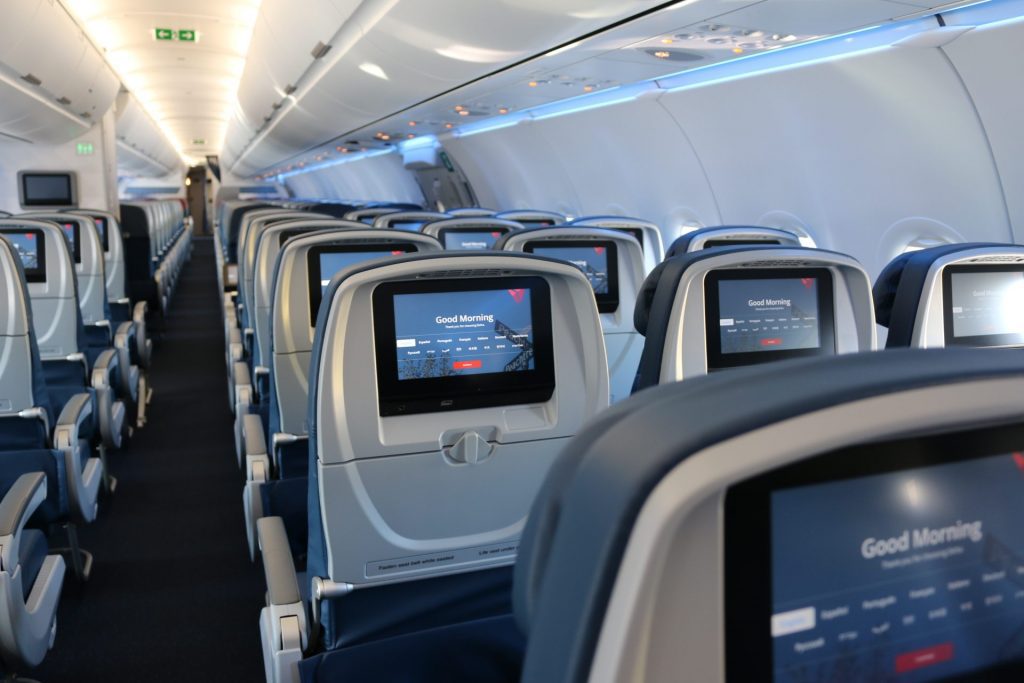Skift Take
Delta is losing about $25 million in revenue this month because of the partial government shutdown. For such a big company, that's not a big number. But clearly Delta would like the government to reopen, and executives spent a good portion of their earnings call discussing it.
Delta Air Lines planned to begin flying its newest — and most comfortable— narrowbody jet into key business markets later this month, perhaps hoping to poach customers from its two biggest competitors. But the government shutdown likely has ruined that plan.
It has also cost Delta about $25 million in revenue this month, as government officials, many of whom are not working, postpone business and leisure trips.
“We are seeing some pressure in our business,’ Delta CEO Ed Bastian said Tuesday on the airline’s fourth quarter earnings call.
Delta will be fine, but the airline is working through contingency plans so it will not have cancel or delay flights next month, when it may have fewer aircraft than expected. The first flight for Delta’s new Airbus A220 has been scheduled for Jan. 31, but it’s becoming less likely that will happen because of the government shutdown.
The Federal Aviation Administration must certify Delta’s new aircraft first, and the entity is working with a smaller-than-usual crew, even after some workers were recently recalled. It’ll happen at some point — “we’re not expecting it to be an extended delay,” Bastian said — but no one is sure when.
About seven new jets are caught up in the bureaucratic mess, executives said. Going forward, Delta warned analysts there is some “potential impact” on other aircraft, including the Airbus A330neo the airline will accept for delivery later this year. Elements of the interior, such as seats and the WiFi system, must be certified by government inspectors.
TSA Waits
Those aren’t the only challenges.
Longer Transportation Security Administration checkpoint wait times are also an issue, Bastian said. This week, Delta’s busiest hub, Hartsfield-Jackson Atlanta International Airport, warned some customers they should arrive as early as three hours before their flight, so they could clear security. On Monday, passengers in Atlanta waited as long as 88 minutes for screening, according to TSA.
TSA screeners, who aren’t getting paid at their usual wages, are taking sick days at higher rates than normal, leaving some airports short-staffed. On Monday, TSA reported 6.8 percent of workers unexpectedly did not come to work, compared to 2.5 percent on Monday, Jan. 15, 2018.
Still, Bastian said, the long lines have not markedly affected Delta’s operations. “It’s in isolated airports, we’re having some longer lines, but it’s not a systemwide issue at all,” he said.
On the call, one analyst wondered whether reports of long lines have spooked others, asking whether business travelers are putting off flights because they don’t want to deal with the airport hassle. Bastian said no.
“We’re not seeing any evidence as people are looking at this extended shutdown as anything other than something that’s going to be resolved hopefully soon,” he said.
Another Profitable Quarter
Despite the recent hiccups, Delta remains highly profitable.
For all of 2018, Delta reported $3.9 billion in net profit on total operating revenue of $44.4 billion. For the fourth quarter, it reported about $1 billion in profit on $10.7 billion in revenues.
The fourth quarter, while strong, was slightly less robust than Delta originally had predicted. Early this month, Delta spooked investors with a warning, saying fourth-quarter unit revenue growth would be about 3 percent, year-over-year, less than the 3.5 percent it expected.
Delta executives downplayed the miss, saying the first three weeks of December were weaker than expected because some business and leisure travelers took a break from flying between Thanksgiving and Christmas. In addition, Hauenstein said, “we gave guidance near the peak of fuel prices and expected fuel recapture initiatives did not materialize.”
Executives said demand and revenue has picked up in January, with corporate bookings up 7 percent year-over-year. They said unit revenue growth for the first quarter will be flat to up to 2 percent, blaming the slow growth in part on the government shutdown.
Regional Weakness
Most regions are performing well, executives said, including Latin American and the Caribbean, where demand is rebounding after several rough years, though Brazil continues to lag.
Domestic routes, which produce about 70 percent of Delta’s revenues, also continue to produce large margins, Hauenstein said.
But Hauenstein noted transatlantic flights, which have produced robust profits for most airlines in the past two years, are not as strong as they have been. In France, he said leisure and corporate business is down because of “domestic unrest,” while in the UK, “the uncertainty of Brexit,” is causing issues. Executives also called out “currency headwinds” on European routes.
Still, Hauenstein said, “While current trends are not as robust as what we saw in 2018, we are confident that the summer will be strong based on early bookings.”
The Daily Newsletter
Our daily coverage of the global travel industry. Written by editors and analysts from across Skift’s brands.
Have a confidential tip for Skift? Get in touch
Tags: airline innovation, delta air lines, government shutdown, tsa
Photo credit: Delta Air Lines said Tuesday it expects to lose about $25 million in revenue in January from the partial government shutdown. Pictured is the interior on a A321 jet. Delta Air Lines
